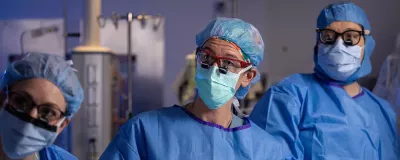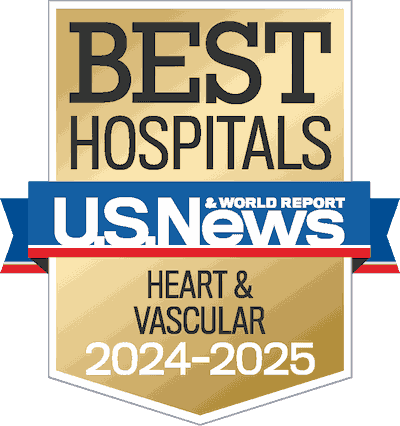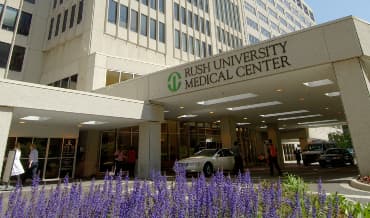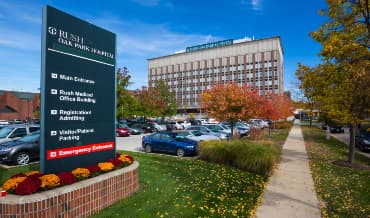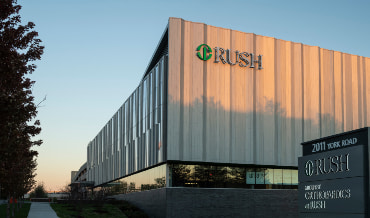Vascular surgery treats conditions affecting the blood vessels, including arteries and veins. The vascular surgeon’s goal is to address these vascular disorders and improve blood flow throughout the body using surgical or minimally invasive techniques.
Some of the common conditions treated with vascular surgery include peripheral artery disease (PAD), aortic or peripheral aneurysms, carotid artery disease, varicose veins and other vascular abnormalities.
The Rush Approach to Vascular Surgery
Whatever your vascular condition, we want to make sure you feel heard and taken care of. That’s why we encourage and include your input when we’re developing your personalized and comprehensive care plan.
Rush is a leading academic medical institution that has been offering vascular disease care to the Chicago area since the 1980s. Our vascular surgeons and specialists have decades of experience diagnosing and treating both common and rare diseases that affect the arteries, veins and lymphatic system. These include aneurysms, peripheral vascular disease (PVD), varicose veins and thoracic outlet syndrome.
Our vascular surgeons use the latest technology — including open surgery, minimally invasive surgery and endovascular procedures — to help you recover faster and with less pain. The team is highly skilled in aortic dissections, complex aortic aneurysm repair, arterial reconstruction, lower extremity bypass, carotid artery surgery, thoracic outlet decompression and venous procedures.
We also specialize in diagnosing and managing non-healing wounds on the limbs, especially the hands and feet. Our approach to wound care includes a range of treatment options, risk factor management and nutrition counseling to help your wound heal and restore any lost function.
Second Opinions for Vascular Surgery at Rush
If you’ve been diagnosed with a vascular condition and a physician has recommended a vascular surgery procedure for treatment, you may want to explore your options by getting a second opinion. Doing so can help you confirm your diagnoses, find possible alternative treatments or make sure that your recommended procedure is the most appropriate form of care.
A second opinion will also give you more information and a broader perspective on your condition, allowing you to make a more informed decision about your treatment.
To schedule an appointment, call Rush at (888) 352-7874 or learn more on our Getting a Second Opinion page. You can also find out more about scheduling a virtual second opinion by visiting our Scheduled Video Visits page.
Rush Excellence in Vascular Surgery
- Nationally ranked, expert treatment: U.S. News & World Report includes Rush on its Best Hospitals Honor Roll and ranks Rush as one of the nation’s best hospitals for cardiology, heart and vascular surgery.
- Care that doesn’t fall through the cracks: We’re committed to ensuring that every patient is given the attention and resources they deserve. A care coordinator follows your care from your first day with us. The coordinator ensures your case is referred to the right specialists, that your entire care team is fully briefed on your case, and your treatment and follow-up appointments are handled correctly.
- Faster, safer recovery: Our providers are all trained in catheter-based treatment techniques to ensure we can offer you safer, less invasive procedures that result in faster recovery.
- Hybrid operating room: Vascular surgeons at Rush University Medical Center in Chicago perform in a state-of-the-art hybrid operating room that integrates minimally invasive procedures with open surgeries to streamline patient care and reduce your length of stay.
- Operation innovation: Rush Copley Medical Center's Discovery GE Vascular Lab offers high-end fluoroscopy image guidance, advanced applications and 3D image fusion, all on a sophisticated device that travels on predefined paths with laser-guided precision.
- Quick access to care: Rush vascular surgery providers offer convenient access to care in Chicago, Oak Park and Aurora. Easy, online scheduling is available.
- Full-team review of patients: Rush hosts a conference with physicians from many different specialties to review cases. Our patients can have confidence knowing that our entire team of doctors have provided input on their surgical and care plans.
- Expertise in reducing your stroke risk: If you’ve been diagnosed with a cerebrovascular condition such as an arteriovenous malformation (AVM) or carotid artery disease, you may be at increased risk of having a stroke. Our team’s comprehensive Stroke-Neurosurgery Clinic can create a personalized treatment plan designed to prevent future strokes. They’ll use their expertise in the full range of medications, surgery, minimally invasive procedures and risk reduction strategies to select the approach that works best for you.
FAQs About Vascular Surgery
To prepare for vascular surgery, you may need some preoperative testing, which can include blood work, imaging studies and other procedures. Your vascular surgeon may request clearance from your primary care physician or cardiologist. Our team will provide specific instructions about fasting, medications and lifestyle adjustments in the days leading up to your surgery.
Our vascular surgeons are experts in handling complex vascular cases, and they’re often sought out to give third or fourth opinions for patients who’ve had multiple interventions. They also collaborate with experts across many specialties to give patients better outcomes and make sure they can explore their options for care.
As with any surgery, vascular surgery carries some risks and possible side effects. These can include bleeding, infection, blood clots, damage to nearby tissue and bad reactions to anesthesia. The specific risks depend on the type of vascular surgery being performed and the patient's overall health. Your surgery team will inform you of these risks before your procedure.
Recovery time after vascular surgery varies based on the type of procedure and how complex it is, the patient's overall health and whether there are any complications. Some patients may get back to their normal activities within a few days, while others may require longer recovery periods.
Postoperative care for vascular surgery often involves monitoring for signs of infection or complications, managing pain and following activity restrictions. Patients may need to take medications, such as blood thinners, and make lifestyle changes to promote vascular health.

